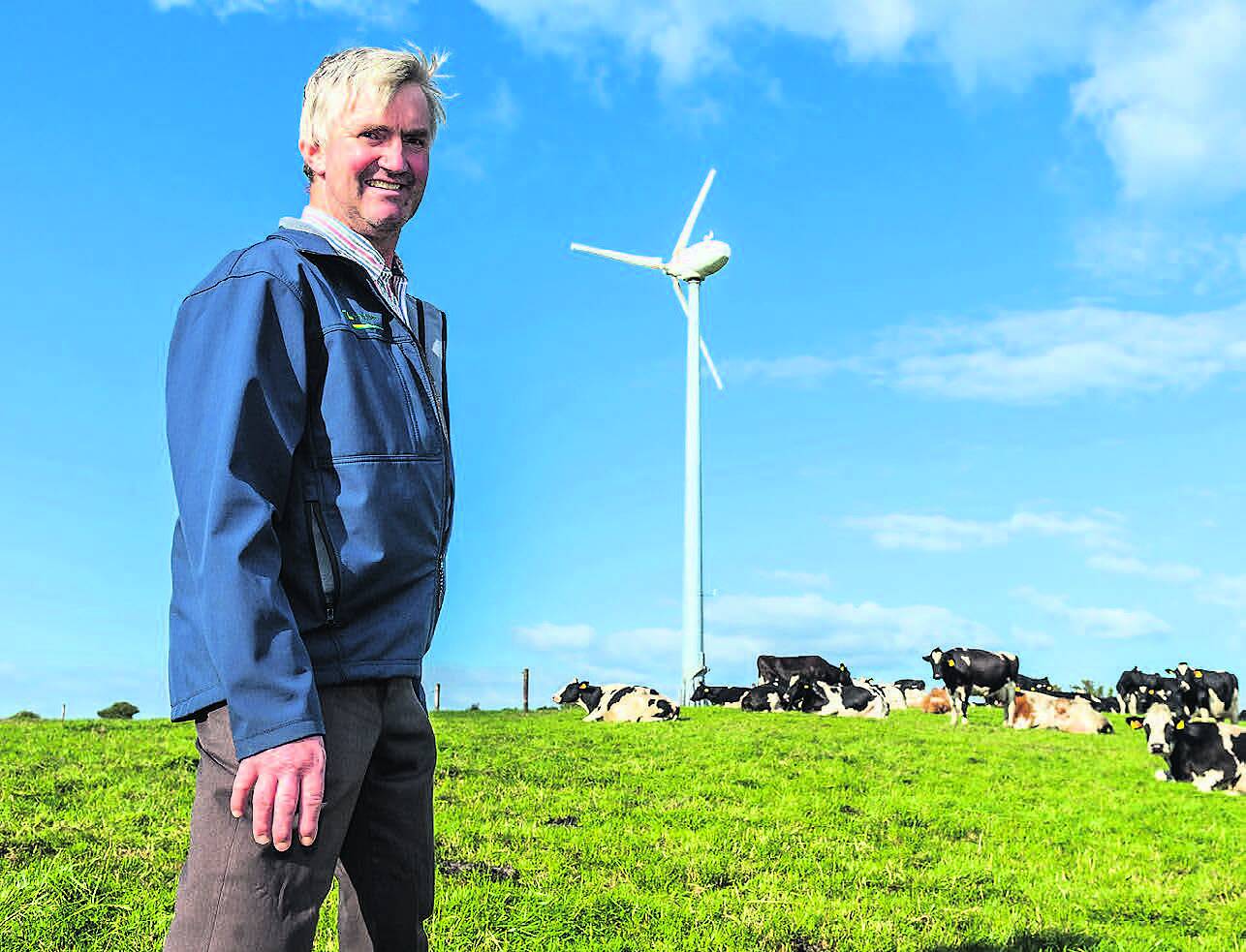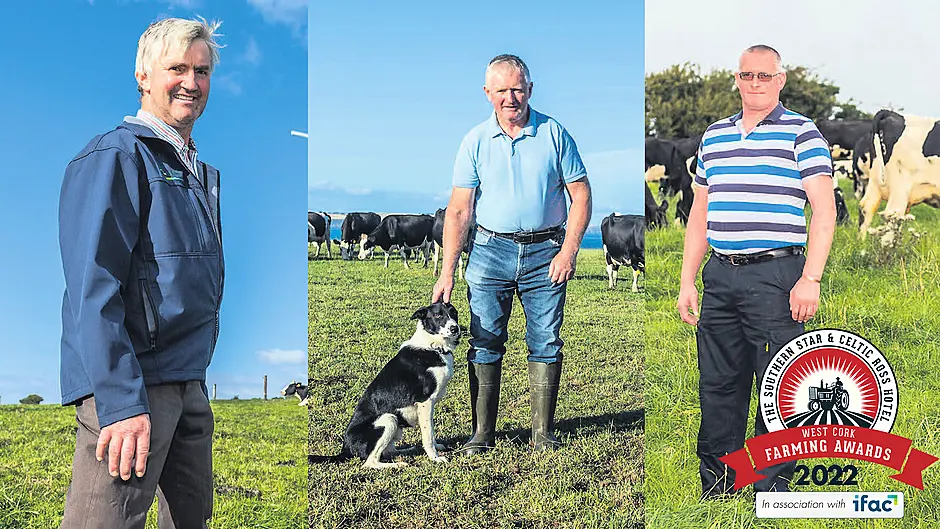THE calibre of farmers who entered the Dairy Farmer of the Year category in our West Cork Farming Awards, was hugely impressive.
The awards, run by The Southern Star and The Celtic Ross Hotel, in association with ifac, celebrate the people, families, businesses and organisations involved in farming throughout West Cork.
The awards also promote and raise the profile of West Cork farming locally, nationally and internationally and they recognise the outstanding contribution the farming sector makes to our region.
Since their inception in 2015, these awards have gone from strength to strength with entries from right across the West Cork region, and in all categories including young farmer, dairy and drystock farmers.
The awards also celebrate farming families and those who have diversified their farms into other new and innovative businesses.
This week we are delighted to reveal the three dairy farmer finalists.
They are: Ronald Shorten, Woodfield, Clonakilty; Gerard McCarthy, Old Head and George Deane, Skibbereen who each impressed our judges with their attention to detail, sustainable practices and commitment to constantly strive forwards.
Other finalists to be announced from next week in The Southern Star are:
- Diversification
- Young Farmer
- Drystock
- Hall of Fame
- Farming Family
All finalists, together with their families, will be invited to a gala awards ceremony at the Celtic Ross Hotel, Rosscarbery which will take place on Friday, October 7th, where category winners will be presented with a specially commissioned trophy and certificate.
IFA president Tim Cullinan will be the guest of honour at the event.
DAIRY FARMER OF THE YEAR FINALISTS - Sponsored by AIB

Ronald Shorten | Clonakilty
INSTALLING a wind turbine on his farm at Woodfield, Clonakilty almost a decade ago to produce green energy, is just one example of how forward thinking dairy farmer Ronald Shorten is.
But there are lots more. Ronald would describe himself as having always adopted new farming approaches since the eighties. His approach is to constantly look forward, and not stand still.
‘Farming is constantly evolving, and we want to evolve with the science as it changes,’ he said.
A supplier of Lisavaird Co-op, Ronald and his son Brian, are the third and fourth generation to farm the land, originally purchased by Ronald’s grandfather in the 1930s.
The family, consisting of Ronald and Brian, Ronald’s wife Betty, and Brian’s brothers Mark and Andrew, is milking 120 cows on 173 acres, producing an average of 592kg of milk solids per cow.
Sustainability is at the core of everything they do and they are part of the Carbery Monitor programme.
‘It’s all about working with nature here,’ said Ronald.
In line with their openness to try new things, they added ‘bugs’ recently to their slurry in a bid to increase fertiliser value and make it easier to handle, which was a success.
‘We’re always learning as we go,’ he said, and they’re also looking at investing in a GPS fertiliser spreader to cut down on waste.
‘Everyone in the farming sector will need to pull together as a team to manage sustainability,’ he stressed.
However, he feels frustrated that agri emission budgets are being set without the full knowledge of important research underway, including a project examining methane emissions at Moorepark.
‘I feel the solutions lie in moving away from fossil fuels, and onshore wind production,’ he said.
His wind turbine produces around 26,000 units of energy a year, and they use around 17,000 of that.
‘We export the rest of that to the national grid,’ he said. For the past few
years he’s been using sexed semen on 100% of the breeding stock to generate high value female replacements.
‘Any cow that was in calf in the last breeding season gets a sexed straw and as a result it means we’re breeding our highest fertility animals.
‘Before this we were using conventional semen, but we now have 70% conception rate, compared to the average of around 45-50%,’ he said.
The Shortens are no strangers to winning awards.
They won the Carbery milk quality and Sustainability Award for 2020.
But Ronald said it’s encouraging to be nominated in this category.
‘Being recognised for what you do is great as it helps you to strive on,’ he said.

Gerard McCarthy | Old Head
GERARD McCarthy has built his farming enterprise at the Old Head Kinsale on solid foundations, over the past three decades.
Gerard commits around 28 hours a week to his building business – house repairs, extensions, carpentry and plastering – but the rest he devotes to his farm.
‘My cows are my number one,’ said Gerard who farms at Ballymackean with his wife Anne, a former nurse, in partnership with their son Stephen.
The couple started farming at this picturesque location in 1984.
At the time the farm was used for growing sugar beet, barley and a small beef enterprise which they continued, while also diversifying into vegetable growing.
But coming from a dairy farm, Gerard was always keen to get back to milking. In 1990 they were allocated a new
entrant’s quota of 10,000 gallons and they’ve never looked back.
‘We started milking 13 cows in the old cow stall with a three-unit bucket plant,’ he recalls.
‘We upgraded over the years and by 2013 we had a 10-unit with jars. In 2020, with Stephen on board, we upgraded again to a 12-unit swift flow commander with swing over arms. Then in 2020 we also built a purpose built calf rearing house with automatic feeder, which greatly increased calf welfare and reduced the workload,’ he said.
Being able to do most of the building work himself meant significant savings.
Today he milks around 75 cows, own 40 acres and rents another 33 acres. Gerard and Anne are parents of four: Stephen (36), Gearoid (34) in Australia; Shane (32) and Ailis, (27). They’re also grandparents of three and are very aware of the role they must play in preserving the land for future generations.
‘There’s only one earth – there’s no sub. To address this we only spread protected urea on the land and all slurry is spread with a trailing shoe tanker. We also use lime as necessary and soil sample and reseed regularly, plant trees and are using white clover,’ said Gerard.
It’s all paying off – his cows are currently producing 7,044 litres of milk, and 566 kilos of solids from 1.5 ton of meal.
He’s also a member of the board of Barryroe Co-op and Shinagh dairy farm, where he was a former chair.
Gerard said he’s passionate that everything they do on the farm must be done 110%.
He admits that both himself and Stephen are perfectionists (they usually take up to three weeks to select their sires), but that they’re learning from each other.
This isn’t the first time he has been highlighted for his work – he won Barryroe Quality Milk Supplier of the Year in 2013, and being a finalist in this category is, he says, ‘a great honour.’

George Deane | Skibbereen
SINCE George Deane started work on his family farm at the age of 16 he’s been continually driving the operation forward, with the results clear to see.
Farming was all he ever wanted to do, and he came on board in 2002 at the third generation farm at Bunalaun, Skibbereen.
As early as 2008, George was futureproofing the enterprise by investing in animal housing facilities.
He built a cow shed, silage pit, and an over ground round tower for slurry storage.
That was followed in 2017 with the major development of an underpass under the main Drimoleague to Skibbereen road, which George described as ‘essential.’
Always keeping a close eye on improving milk quality, he started cross breeding 10 years ago which has helped him increase output of 489 KG/MS in 2020 and 480 KG/MS in 2021.
Over the last two years he has been using sexed semen on his best cows and heifers as well as using high dairy beef index bulls on the remainder of his cows.
George had a conception rate of 62% on first service for his cows and 95% conception rate to sexed semen on the heifers.
Soil fertility is another big emphasis of his – again with milk quality in mind – and he has spread 700 tonne of lime on his farm, and reseeded all of it over the past decade. George was the Drinagh Grass10 monitor farmer and he’s been grass measuring for years, and says he really sees the benefits of it.
He’s also been ahead of the curve and forward thinking when it comes to LESS usage which he’s been employing since 2010, while using protected urea for the last four years or so.
Up to 10% of the farm is reseeded annually with the incorporation of white clover an essential part of the grass sward going forward. He’s also resurfaced several kms of roadway on the farm to enhance the number of days at grass with more water troughs, more wet weather paddocks as well as increased entry and exist points at each paddock.
Married to Sharon, they’re parents of four: Shane (14), Alison (13), Orla (11) and Conor (9) who all have a great interest in the farm.
Being nominated in the dairy farmer of the year category, is he says, ‘great recognition.’
And despite the emission challenges facing the sector, he remains buoyant about the future of agriculture.
‘I see a positive future for the sector,’ he said.
‘There are a lot of changes coming our way, and that’s a challenge but we’re up for that challenge.’
He couldn’t imagine doing anything else but farming.
‘It’s a great way of life,’ he said.
Why we support West Cork farming
By Shane McCarthy, AIB agri advisor
West Cork Farming Awards which showcase and profile the best of farming in West Cork. Agriculture is a significant part of our business in AIB, and will continue to be in the future. It is by far our largest SME sector for new lending in our branches.
In Cork alone, agri accounts for over 40% of our lending to SME customers through our branches and for some individual branches, particularly our rural ones, this figure is a lot higher.
Much has changed in the sector since the last West Cork Farming Awards, and even since the beginning of the year. Input costs remain at elevated levels but thankfully the output price for most agri commodities remains high by historical standards, with prices in the dairy sector in particular at record levels.
If the same trajectory continues we expect margins in most sectors to be maintained at or ahead of 2021 levels, which in itself was a reasonably good year for Irish farmers.
Looking out over the medium-to-long-term, a new Cap Strategic Plan will be introduced in 2023, significant changes have been made to the nitrates action plan and a 25% emissions reduction target has been put in place for the sector by 2030.
One of these elements on their own would have a major impact on the sector, combined they are going to have an even more significant impact on the future shape of Irish agriculture.
What we know in AIB, from many years of serving the farming sector is that farmers and indeed the sector are very resilient.
Farmers want to produce quality, safe, traceable, sustainable food and they want to do more for the environment, reduce their emissions and become more carbon efficient. What they need is the technology, support and direction to enable this.
We know that we are in a time of significant change that there will be challenges ahead and I want to take this opportunity to reaffirm AIB’s position in the agri market. Agri is a significant part of our business and will continue to be in the future.









